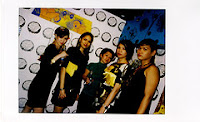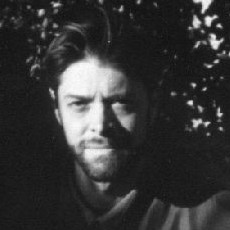Over the course of the years, and based mostly on my experience with the Indeterminacy blog I have developed several ideas about creativity and the creative process. At the very least, they seem to apply to me. This is what I've learned...
1)
When you have an idea or inspiration, act on it immediately. Act on it five minutes later, and it will already be too late. Once I find my inspiration, the process of writing the rough draft goes rather quickly. But if I wait, the flair seems to go out of it. Photos have been a wonderful catalyst for immediate inspirations, usually some devious idea that I want to follow through to the end. However the more I do this, the more difficult it becomes to find a photo that stands out in ways that others before it have not. The first 100 or so stories went fairly well in this respect. Examples where the photo delivered strange and powerful associations might be
Story #6 and
Story #23.
2)
Spontaneity plus afterthought is a powerful combination. On rare occasions a story will come out perfect the first time. Of all my stories, there were only a handful that were completely spontaneous. One example is
Story #30 written in just about the amount of time it takes to read it. I didn't change one word of how it came out.
But usually, the result needs a little twisting and tweaking to add dimensions that bring it past the ordinary and into the extraordinary. During the period that I posted daily I would write the story on the train home from work (I carried a few potential images around in my head to ponder over during free moments) or at home in the late afternoon or early evening. The next morning I'd take the rough draft with me in the train, read through it again and again, fine tune and polish until I thought it was ready to post. At lunch I'd type in my edits and post. Most of the time my edits made something that I thought was boring into something that I was satisified with.
Story #19 was actually a complete rewrite of the original draft (which you can read in the comment section).
Story #385 was one in which the initial version was written rather quickly, but which I polished quite a bit afterwards. The sequence with the "99 Bottles" song was something I put in quite late, as an afterthought.
3)
If you write something good, it will seem better to other people than it will to you. You know what is coming, the others don't. They have the pleasure of watching something unknown unfold before them for the first time, whereas you can only read and wonder, will it work the way you intend it to. This is my conclusion from the positive comments I received about stories that to me were fairly ordinary. It's the only way I could explain it. Also I've read stories, posts, etc. by others and been truly impressed, whereas they in turn seemed surprised. I thought my
Story #43 was rather simple, but I got some nice feedback from some people I showed it to.
4)
If you are true to your art, the process of creating will become more and more difficult, the more you have created. I do not want to write the same stories over and over again, so I find myself discarding ideas because the intended story is too similar to something else I've written before, or is too similar to something I've read elsewhere. I want to create something completely new, but of course I'm aware that this is extremely difficult to do - some claim it's impossible.
To avoid repeating myself, I've allowed the stories to become more and more extravagant. In the beginning my ideal was the one paragraph short story. The first stories were probably more like synopses for what could later be written out in more detail. There was little or no dialogue, just densely packed plot description. Two earlier stories that broke out of this mold were
Story #81 and
Story #158.
A few other stories were new in the sense that I hadn't read anything like them before, not to say that something similar hasn't already been written and I just didn't know about it:
Story #128 (Adam and Evelyn),
Story #204 (Solomonic Wisdom) and
Story #327 http://indeterminacy.blogspot.com/2006/01/all-of-sudden-it-became-light.html (Extreme Poetic Justice). In any event I strive to be original to the best of my knowledge.
5)
Spontaneous creativity vs. planned creativity. Which is better? This could depend on the person. Or maybe it's a matter of taste. I think in general, a spontaneous basis for creativity will win out. In the stories beyond #200 and up to #360, when I stopped posting daily, I found myself having to stay up later and later to find the right idea. The best stories, I think, were written when I was very tired, and unable to reason clearly.
Story #377 and
Story #359 came into existence when I was half asleep and hardly knew what I was writing.
6)
Read great works and allow yourself to be inspired by them. In other words, if you reach for the stars you may not reach them, but you'll reach higher than you might otherwise have been able to. For example, when I was in high school and college I used to read Stephen King. Somehow I got tired of him, but now, in that genre, authors like Edgar Allan Poe and Gustav Meyrink are my idols.
7)
If you get stuck, take a break, watch a TV show, do something else, and then return to finish the writing. Many of my stories were written in two parts. I wrote a beginning, got stuck, watched a Dark Shadows episode, then went back to write the conclusion. One of my non-Indeterminacy stories, "
A Fairytale for Elves and Clouds" was written over the period of several weeks. I wrote the first two paragraphs, got stuck, then came back later with a sudden idea of how it should continue. I think the break forces one out of the rut one might have been in, and allows a return with a fresh, completely unrelated idea.
---
I've probably learned more, but this was all I could put down on one Sunday afternoon. For the interested reader, I point out two pieces I've posted with advice about writing / blogging out of the mouths of
Sir Arthur Conan Doyle and
Mark Twain.
Note: My muse has published her own statement about blogging, indepedent of this one, and I really like what she wrote. It's called "
I am not a good blogger"
Note 2: Viruswitch has posted a piece "
Write in concepts or write in pictures?" and Shtikl writes "
You don’t need a plan, you need skills and a problem" - both posts have bearing on the creative process.
Now I remind myself that I still owe you Story #408. It seems I do put myself under pressure to write something that is better and different than anything I've written before. Wish me luck.
 It was dark. The creature of the night lurked among the shadows cloaking the village. One word permeated every nuance of thought. Blood! BLOOD! He must have blood. But the empty streets yielded no opportunity of fulfillment, no chance encounter to satisfy his hunger. How long had he been this way? Weeks? Months? A hundred years? His thoughts no longer retained the proper order to reflect upon these unclarities. But a feeble awareness seeped into the sea of crimson that was his single obsession. Christmas. Yes. Christmas. That is why the streets were deserted, why the hunt remained fruitless. Everyone was indoors, huddled with friends and family around a warm fire, or a table with candles and a feast, communing with one another, sharing remembrances with one another. Christmas. That was so long ago...
It was dark. The creature of the night lurked among the shadows cloaking the village. One word permeated every nuance of thought. Blood! BLOOD! He must have blood. But the empty streets yielded no opportunity of fulfillment, no chance encounter to satisfy his hunger. How long had he been this way? Weeks? Months? A hundred years? His thoughts no longer retained the proper order to reflect upon these unclarities. But a feeble awareness seeped into the sea of crimson that was his single obsession. Christmas. Yes. Christmas. That is why the streets were deserted, why the hunt remained fruitless. Everyone was indoors, huddled with friends and family around a warm fire, or a table with candles and a feast, communing with one another, sharing remembrances with one another. Christmas. That was so long ago...































